Back in March, RahjIII, admin of The Last Outpost MUD, reached out to me over Discord to let me know about a web-hosted telnet client he’d developed called LociTerm.
Right away, I was intrigued. The client was designed from the ground up for accessibility and long-term use, with thoughtful support for mobile users, screen readers, and even audio captioning. It’s also a handy portal to a growing list of over 200 games.
I asked Rahj if he’d be up for an interview, and thankfully, he agreed!
In this post, he talks about how The Last Outpost got started, why it’s still here 30 years later, and what it’s like to build a browser-based client for today’s internet.
Whether you’re here for the tech, the history, or a better understanding of modern MU* systems, I hope you’ll enjoy this one.
Table of Contents
- Meet Jeff: caretaker of The Last Outpost
- Jeff's journey into MUDs
- LociTerm: a web-based MUD client for modern devices
- Accessibility and mobile-first design
- Lessons learned from decades of development
- Overcoming challenges in unfamiliar dev territory
- Recommended resources for MUD developers
- What's next for LO and LociTerm
- Preserving history, keeping it playable
Meet Jeff: caretaker of The Last Outpost
Jeff Jahr, known in-game as RahjIII, is a longtime developer, network security engineer, and quality assurance specialist with a degree in Computer Science from the University of Michigan. He spent most of his career working in Silicon Valley before retiring and moving back to his home state of Michigan.
These days, he has more time to focus on one of his favorite lifelong hobbies: multi-user dungeons (MUDs). He’s best known for maintaining The Last Outpost (called “LO”, for short), which first opened to the public in 1992.
Here’s the official description of the game:
Along with exploring and advancing through the game world, The Last Outpost offers players the ability to lay claim to the zones that make up the land. Once claimed, a zone can be taxed, and the player making the claim gets to decide the player killing policy within the zone. Whoever claims the whole world is declared the Leader of the Last Outpost!
The Last Outpost has a unique world, player elected clan membership, player regulated PvP, and a hands-off policy for administrators. Custom Adventure Fantasy / Medieval Fantasy English Speaking Server located in United States of America. Runs dikumud LastOutpost 4.48. Online for 33 years.
Jeff is also the creator of LociTerm, a web-based client that allows anyone to connect to MUDs, including LO, without needing to install a program on their device’s operating system.
Outside of development, Jeff’s interests include retro hardware, ASCII art, and accessibility design. He created the original LO splash screen himself and has continued to update it over the years – doubling its width, adding dragons and storm clouds, and making sure it dynamically adjusts based on the size of your client window:
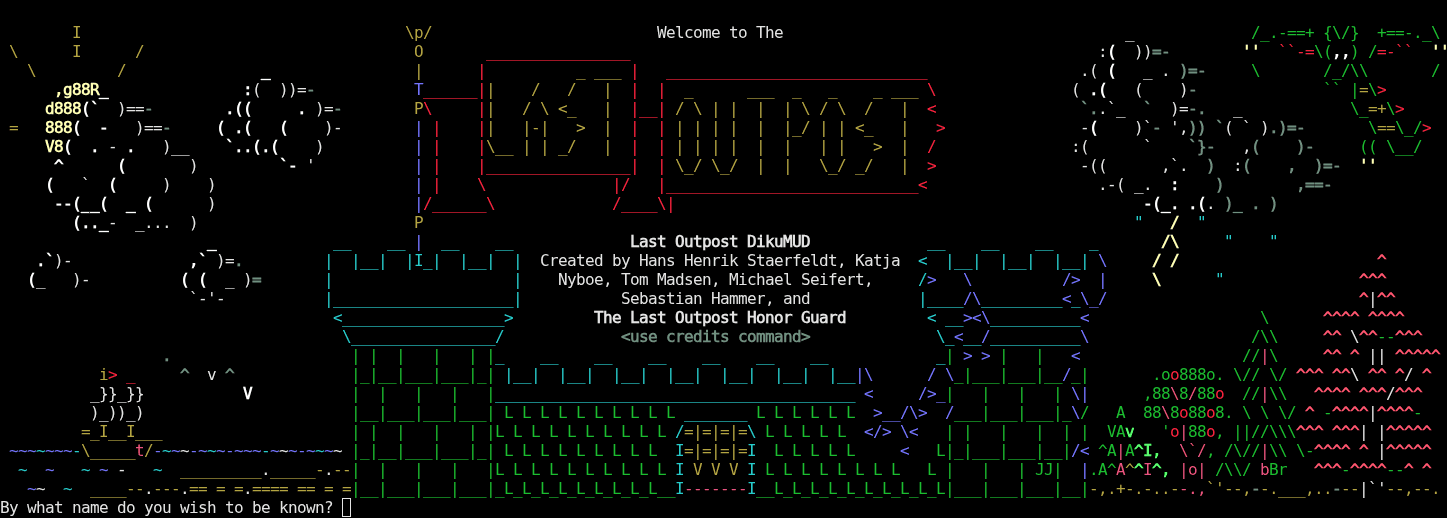
Jeff’s journey into MUDs
In the late 1980s, the internet wasn’t yet the internet as we know it today. It was still the NSFNET, a mostly academic network sponsored by the National Science Foundation.
The NSFNET was entirely text-based and accessed through hardware terminals – early computer systems that often combined a built-in keyboard and CRT screen in a single unit.
Jeff and his friends, located across different universities, stayed connected using email, IRC, and eventually MUDs.
Their first shared game was TinyHELL, a talker-style world-building game. But it wasn’t long before they migrated to EPIC MUD, an early Diku-inspired server. When two of Jeff’s friends, Roo and Julio, decided to launch a MUD of their own, they invited him along.
And so The Last Outpost was born.
From ASCII artist to playtester to admin
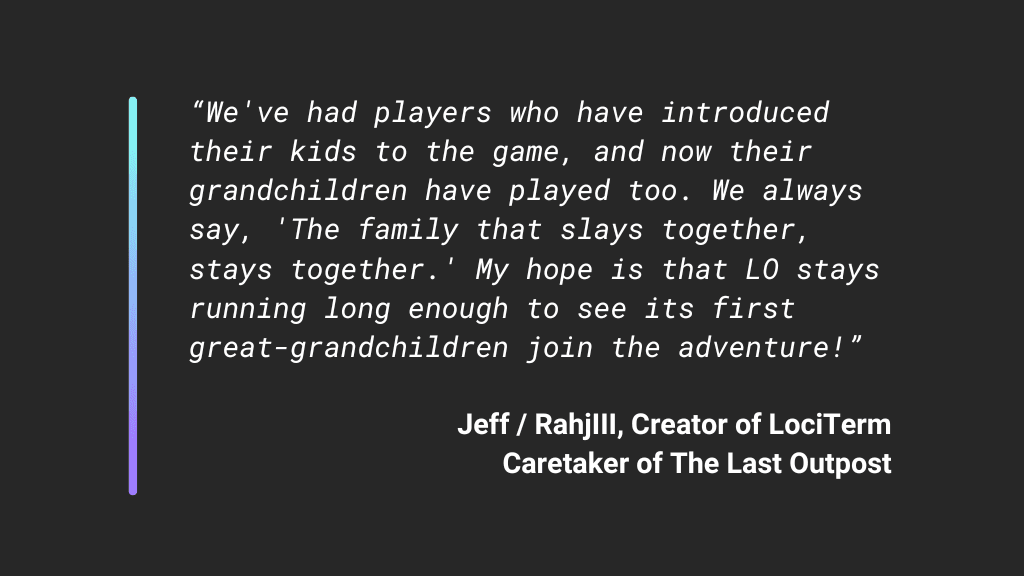
At first, Jeff was recruited to help with ASCII art, playtesting, and a few area builds. But what he quickly became known for was his “bad computer karma.”
“I have always had a reputation for being ‘very unlucky around computers,’ in that whatever I did seemed to bring out the worst kind of bugs in whatever software I was using,” he explained.
Jeff’s tendency to uncover bugs made him the perfect QA tester and worked to his advantage in RL, as well; he was able to turn that talent into a full career in software testing.
Over time, Jeff became a visible in-game admin, an area builder, and eventually the primary coder for LO. When Roo left to work at Simutronics and Julio moved on to other projects, Jeff took over full responsibility for the MUD – and never stopped working on it.
Today, he sees his role as part caretaker, part curator.
“The game needs to be kept technologically up-to-date so that it can stay running on modern systems,” he said, “But it also needs to have a ‘continuity of feel’ so that returning players still recognize it from its early days.”
“We’ve had players who have introduced their kids to the game, and now their grandchildren have played too. We always say, ‘The family that slays together, stays together.’ My hope is that LO stays running long enough to see its first great-grandchildren join the adventure!”
LociTerm: a web-based MUD client for modern devices
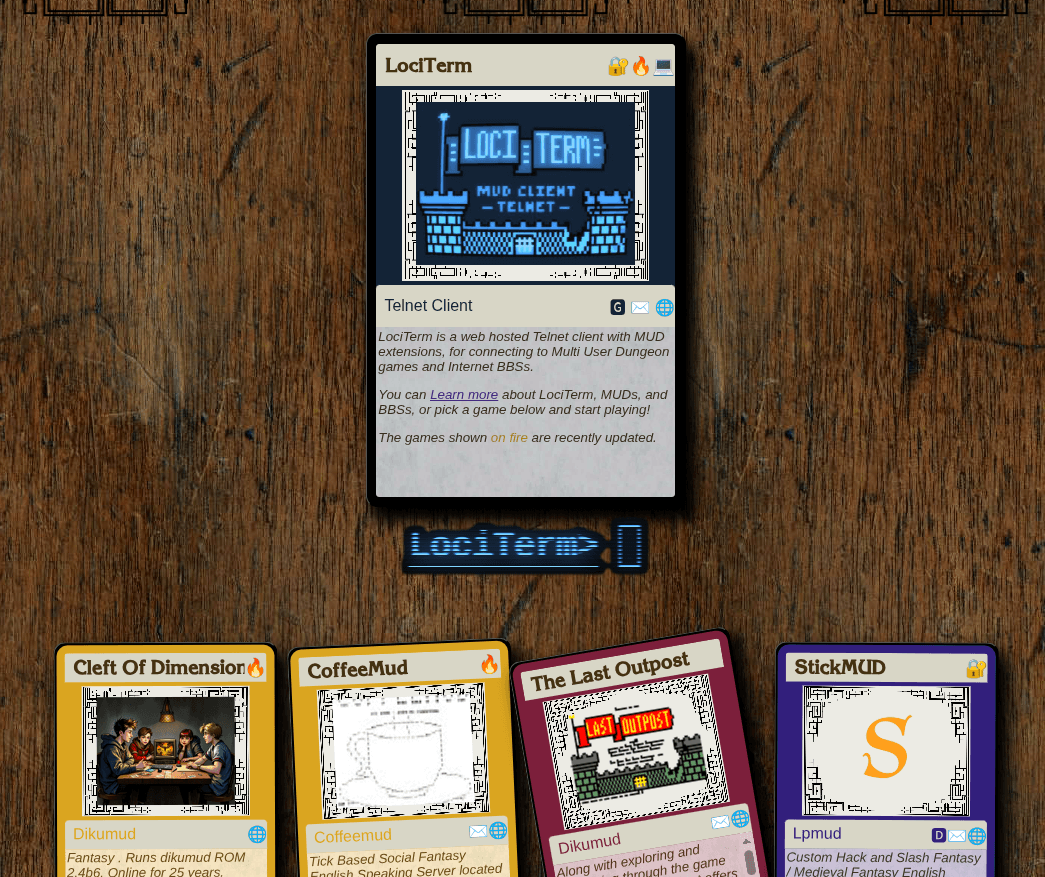
Over the years, Jeff has seen a lot of MUD client technology come and go.
“MUDs were originally hardware serial terminal games that were played at 9600 baud or less, using a program called Telnet,” he explained.
To put that in context, it was roughly 100,000 times slower than my current fiber internet connection.
“Telnet was like the web browser is today,” said Jeff. “Every internet-connected system had a copy of Telnet.”
Over time, as ‘browsing the web’ became more popular, operating systems stopped shipping with a copy of Telnet, and dedicated MUD clients began filling the gap. The problem with those early clients was that they usually ran only on specific platforms and weren’t guaranteed to keep working when their developers stopped maintaining them.
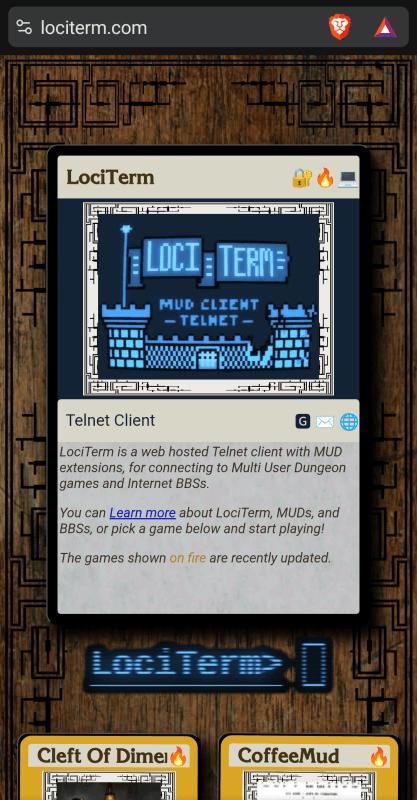
This led Jeff to build his own fallback client – one that would keep working as technology changed.
Around 2008, he adapted code from the Shellinabox project and created a browser client called LOinabox, which served players of The Last Outpost for years. When upstream development stopped and the maintenance overhead became too much, he started over from scratch.
The result was LociTerm – a clean, open-source, general-purpose client that runs in any modern browser, on just about any device.
“For LO and MUDs in general to survive, they need to be as playable as possible on touchscreen devices,” he told me.
Jeff created the LociTerm client with a mobile-first mindset to make sure it works just as well on a phone or tablet as it does on a desktop.
And by all accounts, it does!
Jeff has tested it on Windows, Mac, Linux, Android, iOS, a PlayStation 3, and even a few in-car infotainment systems.
“Not that I recommend MUDding while driving,” he added, “but I think it is an exciting challenge to bring the MUD hobby from its early mainframe workstation roots to the latest technology of today.”
Can you guess where the name LociTerm came from? Read to the end to find out!
Accessibility and mobile-first design
LociTerm isn’t just built to run anywhere – it’s built for everyone. Jeff has taken special care to incorporate accessibility features into both the client and The Last Outpost, drawing on years of player feedback and his own experience using legacy hardware.
“I try to keep as many of the screen reader accessibility hints enabled as possible,” he said, referring to ARIA attributes that help assistive tech interpret the terminal output.
LociTerm also includes OpenDyslexic fonts for players with dyslexia, along with a contrast setting that improves readability for users with low vision or color blindness.
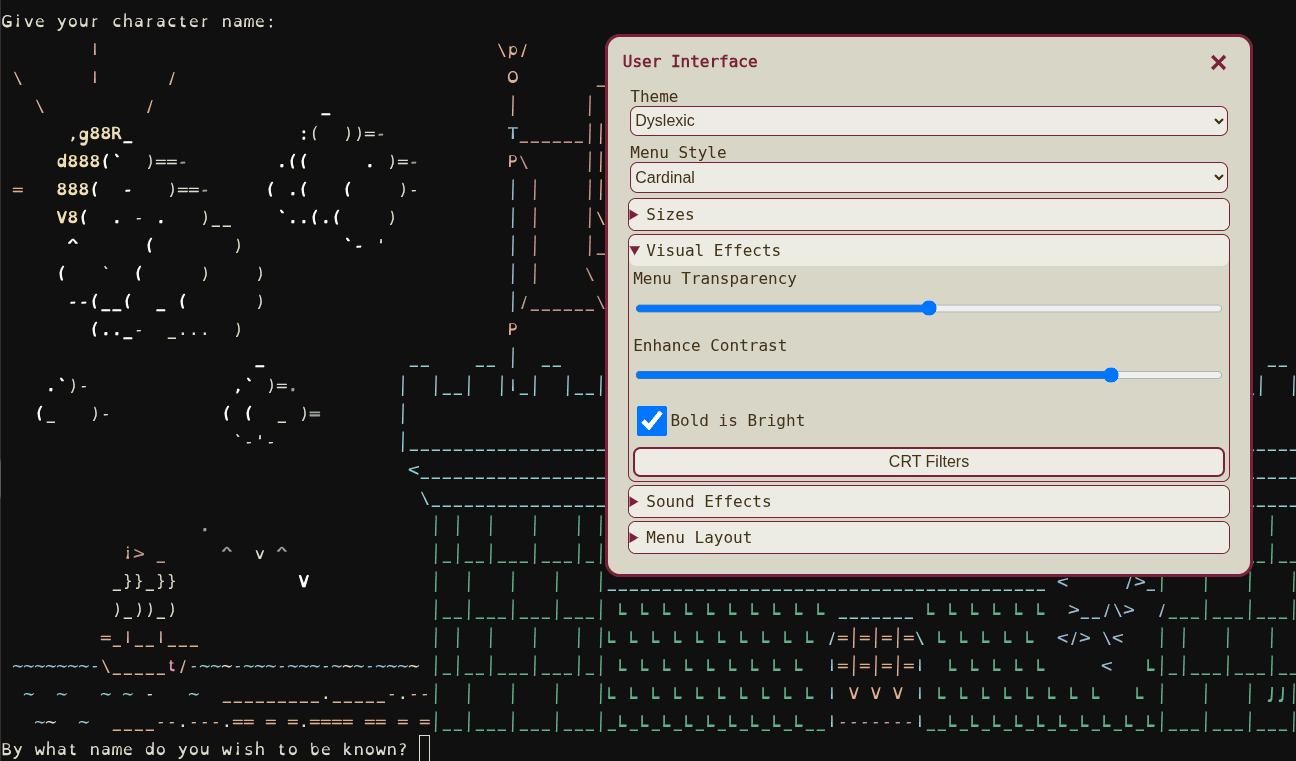
The contrast setting is particularly helpful in games that use “truecolor” text with dark colors on dark backgrounds, as it gives players more power over how content appears on their screen no matter what the original game intended.
In The Last Outpost, Jeff took a similar approach. The MUD has a screen reader mode that strips out color codes and symbols, translates emoji into plain text, and offers optional command outputs that reduce clutter. By design, anything conveyed through visual formatting is also provided in text.
Using LociTerm on any hardware
A core tenet of web accessibility is that it doesn’t just make the web better for people with disabilities – it makes the web better for everyone.
This also includes users of older hardware!
“Our development team was still using monochrome hardware terminals well after color and Emoji-aware PC clients became standard,” Jeff said.
In fact, he still uses a vintage VT510 terminal for development and testing.
The green CRT theme in LociTerm was modeled after that very terminal. So was the LociTerm client’s computer icon – based on a photo Jeff took of the same machine.
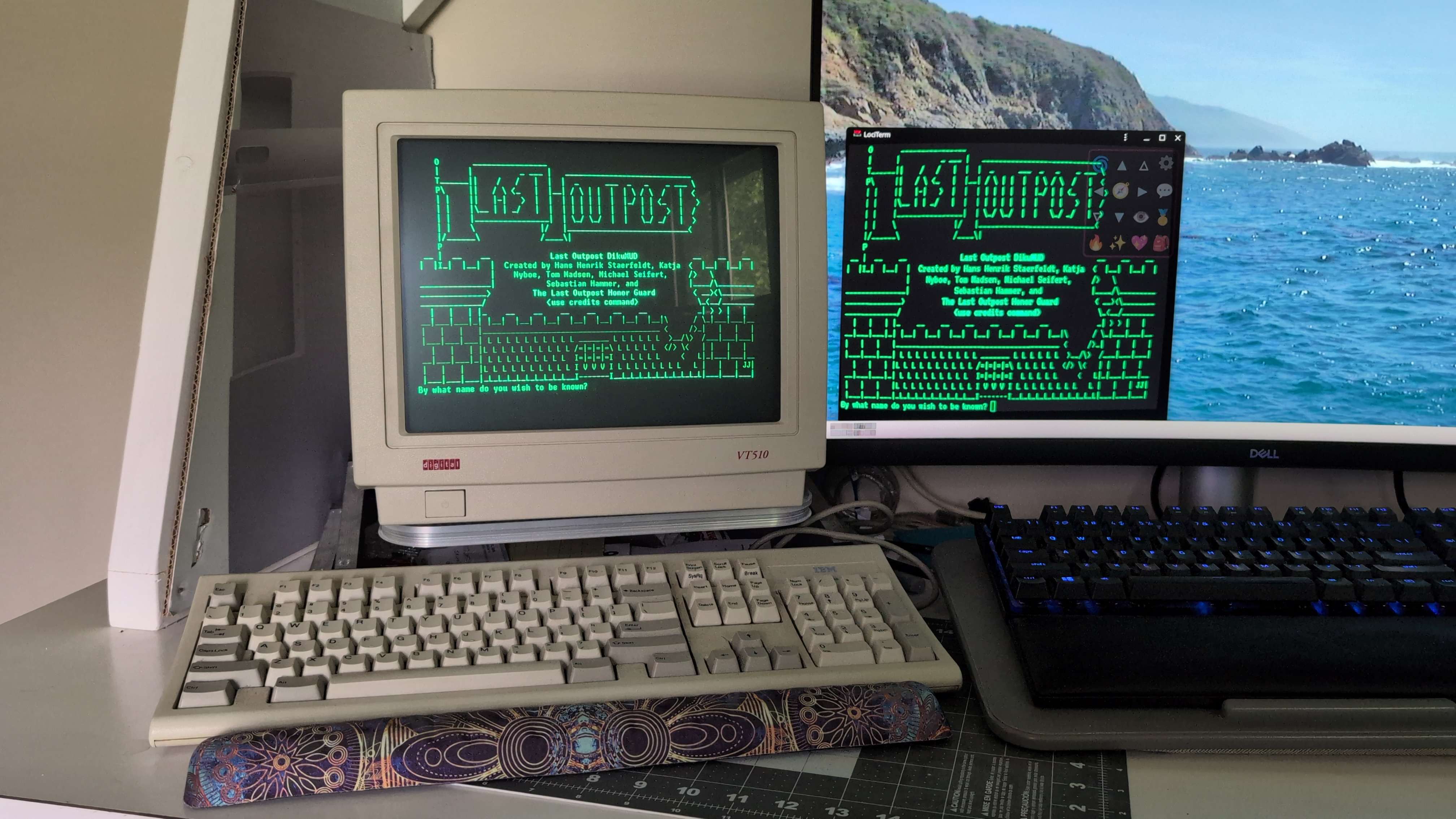
While future maintainability and the ability to keep connecting to The Last Outpost was Jeff’s original inspiration for the LociTerm project, that’s not all that’s kept him going.
“Of course, it is the players and other MUD operators that really keep me motivated,” he said. “Without their continued interest and feedback, it wouldn’t be nearly as much fun.”
Lessons learned from decades of development
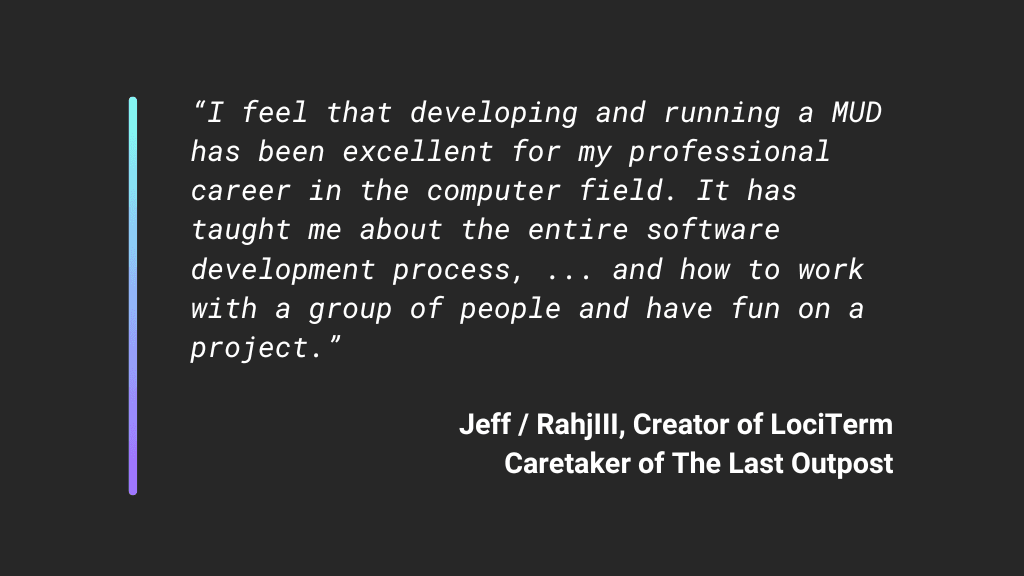
For Jeff, working on The Last Outpost and LociTerm hasn’t just been a hobby – it’s been a long-term education in software development, community management, and platform stewardship.
“I feel that developing and running a MUD has been excellent for my professional career in the computer field,” he said. “It has taught me about the entire software development process, from product management, development, deployment, support, user management, and how to work with a group of people and have fun on a project.”
“LO has had over 50 individual contributors, and a huge number of players over the years,” he added. “It has been, and continues to be, a great learning experience.”
Running a game for more than 30 years taught Jeff how to manage updates, adapt to shifting platforms, and support players over multiple generations. It also taught him to be cautious with emerging technology.
While new tools and frameworks are always tempting, Jeff learned that long-term reliability is more important than getting swept up by the “new hotness,” as he put it.
“A lot of promising new tech dies out surprisingly quickly,” he said. “Keeping the same code going through three decades of technological changes hasn’t been easy, and I’ve learned how important it is to make wise technology choices.”
That means resisting the urge to jump on the latest trend, even when it looks genuinely exciting. For Jeff, thoughtful restraint has helped the game stay stable and functional, even as the landscape around it continues to shift.
Overcoming challenges in unfamiliar dev territory
Despite his long career in software development, Jeff hadn’t built a full web application before starting LociTerm. Learning JavaScript and navigating the modern browser build ecosystem came with a learning curve – especially after years of working on lower-level systems.
In Jeff’s own words, it was, “eye-opening.”
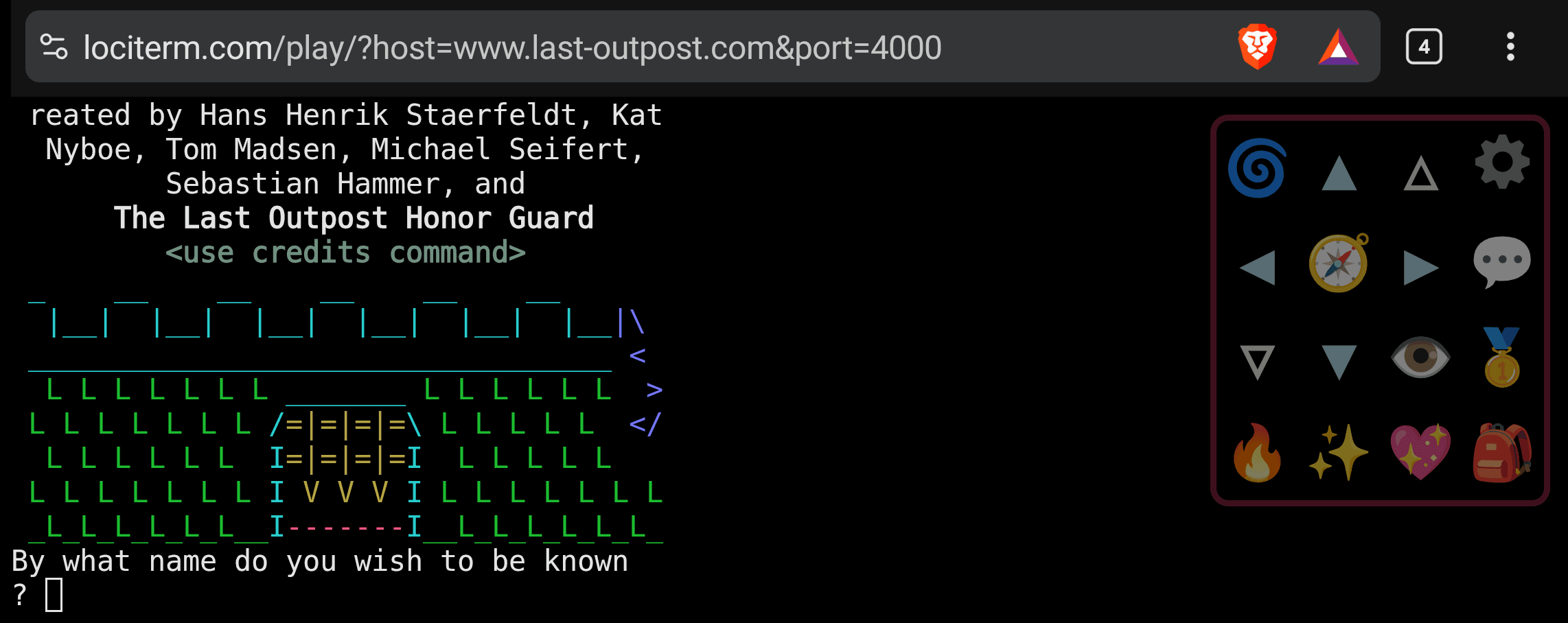
“It really helps to be able to have a group of knowledgeable people to ask questions of,” he said. “And to be unafraid to admit that, even after a long professional software development career, I really had no idea how to write working code in the JS/Web space.”
He credits the supportive MUD dev community for helping him get up to speed. That humility, paired with a clear sense of purpose, is part of what shaped LociTerm into a practical, user-friendly tool.
Recommended resources for MUD developers
For anyone thinking about building their own client or contributing to MUD development, Jeff had a few solid suggestions.
First and foremost: “The /r/MUD Discord #development channel was indispensable to me,” he said. “You won’t find a smarter, more helpful, more experienced group of MUD programmers anywhere else.”
He also gave a shout-out to Writing Games’ own MUD Resources page, saying “The general index of MUD resources there is superb.” Aww, shucks. Thank you, Jeff! 😊
And for anyone working on client protocols or implementation details, you may be interested to know that Jeff maintains his own curated list of MUD-relevant protocols. It’s a clean, accessible reference that reflects the same thoughtful attention to detail that he brings to both The Last Outpost and LociTerm.
What’s next for LO and LociTerm
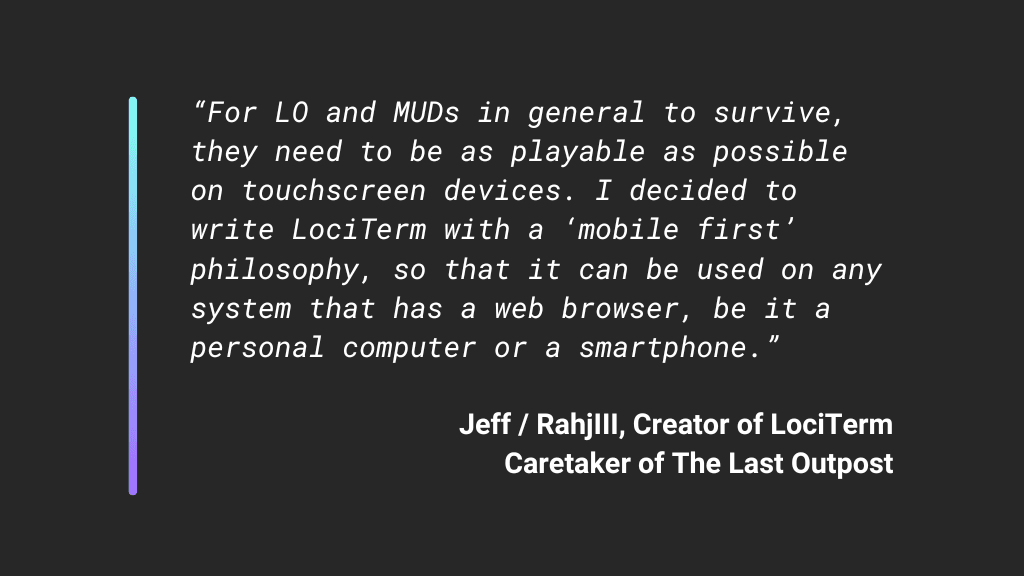
Even after more than three decades, Jeff isn’t slowing down. He’s still actively developing both The Last Outpost and LociTerm, with several updates already in the works.
Right now, he’s working on improved color and link handling to support OSC8-style hyperlinks – a “newer” standard gaining adoption in terminal applications.
He’s also added sound support to LociTerm using the Client.Media audio extension protocol. You can hear it in action when you first create a character: as you stand in the town square, the game plays the sounds of a bustling medieval settlement.
But it doesn’t stop there. In collaboration with Tamarindo of StickMUD, Jeff added a “caption” tag to the protocol, specifically to support key captioning for sound effects – something he describes as “a good first step toward increasing accessibility for sound-enabled MUDs.”
The idea is based on guidelines from the Described and Captioned Media Program, which encourages consistent, meaningful text alternatives for audio cues.
“A game author could of course go to the effort of printing caption text into the normal game text stream,” Jeff said, “but that would mean every game would print out captions slightly differently, and each game would have a different command for turning it on and off.”
By baking the captions directly into the protocol, the feature becomes client-side, consistent, and easier for players to enable or disable as needed.
“MUD accessibility isn’t just about screen readers,” he added.
Meanwhile, the LociTerm-connected game list continues to grow. Since launching earlier this year, over 200 MUDs have been added to the directory. Jeff is thinking about ways to make it easier to search and navigate through the list, especially for new players or developers browsing for ideas.
And of course, there’s always something going on with The Last Outpost. Whether it’s refining older systems, adding modern features, or just keeping the game humming along, Jeff remains deeply involved.
“Feel free to check out LO and LociTerm,” he said. “Everyone is welcome.”
Preserving history, keeping it playable
What makes Jeff’s work stand out isn’t just how long he’s been doing it – it’s how intentionally he’s approached the challenge of keeping The Last Outpost playable and accessible, even as the technology around it keeps shifting.
From VT150 terminals to smartphones, from Telnet to browser-based clients, he’s adapted the game without losing sight of what made it enjoyable in the first place.
LociTerm isn’t about reinventing MUD clients – it’s about giving players a way to connect on the devices they’re already using.
Jeff also doesn’t see himself as doing it alone. When asked who he’d like to thank, he simply said, “Too many [people] to list. But check out the Credits in LO and in LociTerm. I always try to give credit where it is due.”
And oh does he…
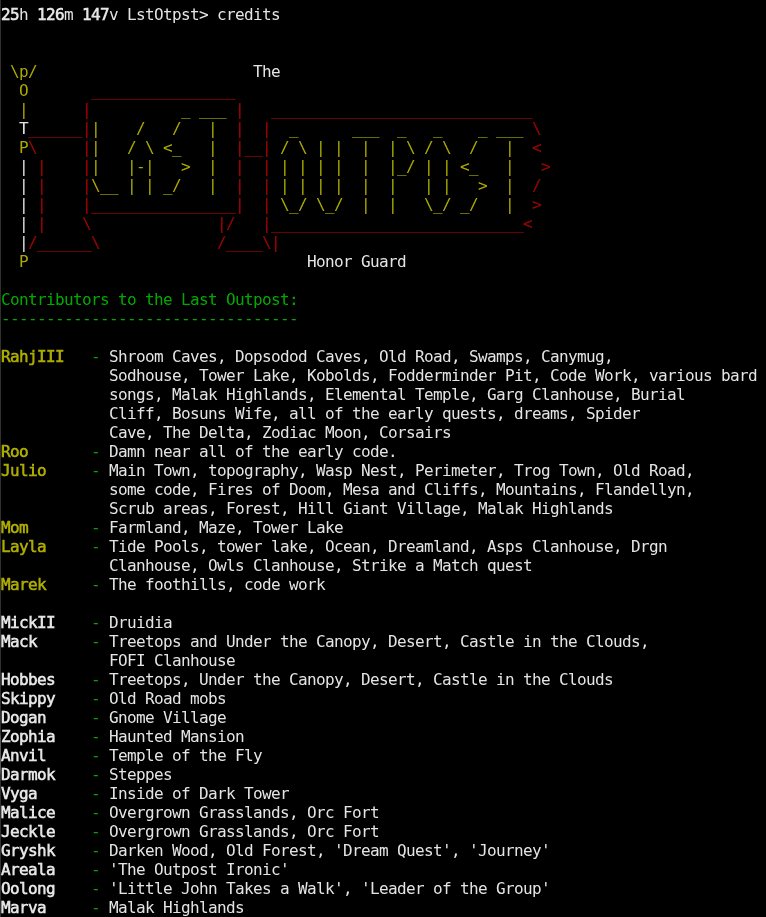
A big warm thank you to Jeff, AKA RahjIII, for taking the time to do this interview – and for reaching out to give me a heads up about the LociTerm project! The name LociTerm comes from Last Outpost Client Implementation Terminal. In a sense, its name contains its roots.
You might be tickled to know that in the process of wrapping up this interview, Jeff stumbled upon a “bug” in Writing Games. My aggressive caching settings were once again interfering with my newsletter sign-up form. Thanks to his talent for finding issues, I was able to get it working again, so visitors can now subscribe to get monthly updates once more. Appreciate you, Jeff!
Lastly, as someone with hearing loss, I really appreciated the thoughtful decision to add captioning for audio cues – not just because it helps people like me, but because it shows a broader commitment to inclusive design. Text cues for sound are much less talked about in the MUD space, and I’m glad to see Rahj and Tamarindo bringing important accessibility ideas to life. I can’t wait to see what you guys do next!
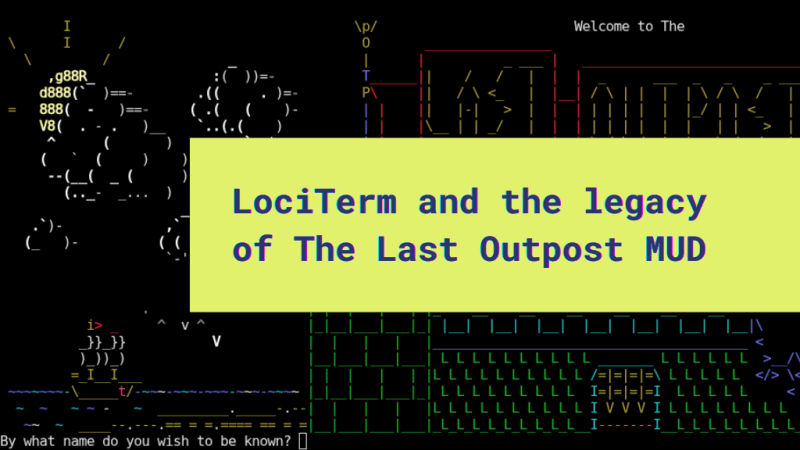

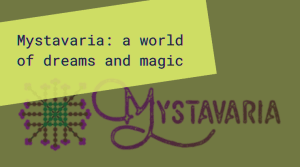
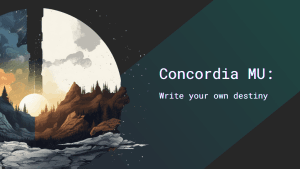
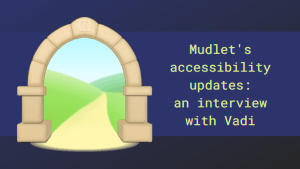
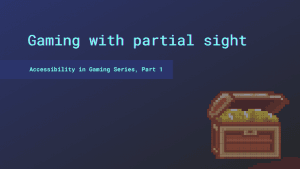
Leave a Comment